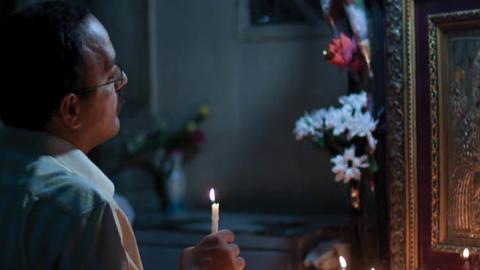As rare as it may be for an article in an anthropology website to ignite fierce debates within the Coptic community, a piece by Candace Lukasik, a PhD candidate at the University of California, Berkley, has managed just that with many Copts questioning her portrayals of their community and story in the United States. Yet such debates are warranted. For while the article is billed as one about Middle Eastern Christians and US immigration policies under Donald Trump, the article’s claims are far wider with huge implications for Copts in the West. To understand why, we must examine the four main claims that lead to her conclusion in order to understand the article’s inherent flaws.
First, the author claims that while Westerners and Copts understand Coptic immigration as the result of persecution, in reality it is also due to other socioeconomic reasons. On the face of it, there is nothing wrong with that claim. No one would argue that the decision to emigrate, for Copts or any other people, is not a complex one that involves various reasons. But by attacking a strawman argument, the author ignores and downplays the structural nature of the oppression Copts live under as mere incidents of discrimination and not as an overarching framework that governs every aspect of Coptic life in Egypt.
Take for example those poor Coptic villagers in the south of Egypt, where the author’s doctoral fieldwork was. Can we discuss the plight of those poor Copts without mentioning the fact that Copts lack adequate political representation at every layer of local government, contributing to them receiving fewer government resources? What about those once-influential Coptic landowning families whose villas “now haunt contemporary communities”? Can we ignore the fact that while Egypt’s land reform programs under President Gamal Abdel Nasser took away the lands of most Muslim and Christian large landowning families, they only distributed that land to Muslim farmers, completely excluding Copts? Doing so ignores the structural and continued nature of social dhimmitude that Egypt has maintained for centuries. It also bypasses the reality that Copts face discrimination in every aspect of life, from job opportunities to Coptic kids being excluded from sports. No Copt, no matter his or her social and economic status, is completely immune from that.
Second, Lukasik argues that American political and religious leaders use the portrayal of Copts in the West as “exemplary Christian victims” for both “the advancement of domestic issues and as one of the central reasons for continued US military presence in the Middle East.” This American championing of Copts and other Middle Eastern Christians “hinges on the post-Cold War remapping of the world, prompted by politicians and evangelicals, as a civilizational battle between Christianity and Islam.” Middle Eastern Christians, as the author claims, are now “part of a transnational form of Christianity,” that is “interwoven with American empire and geopolitical interests.” If only any of that was true.
In reality, the plight of Copts and other Middle Eastern Christians is merely an afterthought in the West. True, the Trump administration, in a welcome departure from Barack Obama’s policies, has made sure that aid to Iraq reaches vulnerable, previously excluded minority communities. But in the long list of US policy interests in the Middle East, Christians are way down on the list, even under this administration. While the Trump administration and several evangelical leaders have shown some interest in Middle Eastern Christians’ plight, such interest has been largely rhetorical, with Copts hardly figuring in it at all. No Middle East policy practitioner in Washington would argue that the plight of Copts is “one of the central reasons for continued US military presence in the region,” or that Copts “have figured prominently” in the administration’s initiatives “on aiding persecuted Middle Eastern Christians.”
Those two arguments—which downplay the persecution of Copts and claim that the administration politicizes their plight in service of American empire—merely serve as the ground for the article’s main arguments. Lukasik says there is a contradiction between the claimed interest in helping Copts and the administration’s policies that target the green card lottery by which many Copts have immigrated to America. Had the author made this point separately from the prior and subsequent arguments, it would have been a fair one. Middle Eastern Christians attempting to immigrate to the United States have indeed seen the doors closed in their faces under the Trump administration, and the administration should be criticized on that front. Of course, when the Trump administration attempted to prioritize Middle Eastern minority communities as refugees in its first executive order, all hell broke loose, even though such prioritization of vulnerable communities had been a long-standing US practice in other regions and countries.
But the article claims that such policies are not only the result of “prevailing Islamophobia that spans political and social realities,” but that such Islamophobia and anti-Muslim rhetoric affect non-Muslim Arabs. In fact, as the author states, Copts, “as people of color,” “face discrimination because of their racial differences from white America and encounter the same sort of targeted profiling and hate crimes as do their American Muslim counterparts.” To prove her point, the author cites the case of Adel Karas, a Copt murdered in California a few days after 9/11. In doing so, the author ignores that, while many Copts do indeed believe that Karas’ murder was a hate crime out of misidentification as a Muslim, such claims have no evidence, and the police rejected them because they believe gang members murdered him in an extortion attempt.
Many American Copts in the past week have questioned these assertions by the author. While some have experienced prejudice in America, they reject the attempt to create a moral equivalence between the persecution they faced in Egypt and whatever experiences they have in America. As many pointed out, the Coptic experience is the United States has been extraordinarily successful, with Copts reaching heights they wouldn’t have dreamt of in Egypt. Furthermore, the language of “people of color” is alien to the majority of Copts, who do not identify as such.
But these and previous claims only serve to lay the ground for the author’s main argument: because Copts have been included among “suspicious bodies,” together with Muslims, Copts “have tried to combat such suspicion through highlighting their Christian faith” and “have been compelled to distance themselves from” other communities and people of color, by “American religious and political forces.” It turns out it’s all America’s fault after all.
Here lies the main problem with the article. Outside of its wrong claims, the article shows a clear lack of knowledge of anything resembling Coptic culture or history. Copts do not highlight their Christianity in America any more than they do in Egypt. Persecuted for their Christian faith in Egypt, Copts tattoo a cross on their wrists. Facing discrimination that targets them based on their names, they give their sons and daughters the names of saints. Copts are a proud people; they are not butchered like sheep, but instead carry their Savior’s cross with him.
It is true that there are prevailing anti-Islam sentiments among Copts, and that unfortunately many Copts even hold anti-Muslim views. But the attempt to portray them as the result of America is ridiculous. Copts themselves need to confront these hateful views, instead of blaming them on someone else. Remarkably, the one Copt who expresses anti-Muslim views, whom the author cites, lives in Bahgoura, Egypt, and not New Jersey. After all, 50 years in America cannot possibly be presented as an explanation for these ills compared to 1,400 years of dhimmitude in Egypt.
Read in Providence Magazine



















